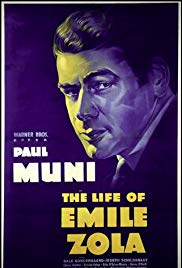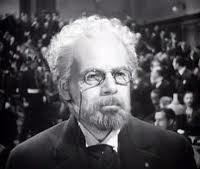Emile Zola (1840 – 1902) founded the school of naturalism in literature, an attempt to describe the world realistically and to deal with the problems of society and of ordinary people. His successes included studies of alcoholism in The Dram Shop, prostitution in Nana, and the life of poor miners in Germinal. In his early years, Zola was not afraid of taking on revered institutions in French society. For example, he exposed incompetence in the Army General Staff in The Betrayal.
In 1894 Alfred Dreyfus (1859 – 1935), a Jewish captain in the French Army, was convicted of spying for the Germans. He was sentenced to life in prison on Devil’s Island, a small desolate bit of land off the coast of South America. Throughout, Dreyfus maintained his innocence. Later, evidence uncovered by Colonel Picquart, head of French Military Intelligence, implicated an officer named Esterhazy. However, in order to prevent embarrassment to the French Army, on orders of the Chief of the General Staff, high ranking army officers forged documents and ordered an acquittal of Esterhazy in a court-martial. Picquart was sent to a desert post and later imprisoned to keep him quiet. The Dreyfus case aroused anti-Semitism throughout France. The Roman Catholic Church, which was part of the French state at the time, supported the conviction.
At the beginning of his career, Emile Zola lived the life of a starving author. His books were unappreciated by the publishers and the public. He was hardly able to eat. But by 1900, after decades of struggle, Zola had finally gained success and affluence. He was considered a great novelist by the French literary establishment. His books sold well. Zola lived well. He knew that if championed Dreyfus’ innocence, he would be tried for criminal libel and that he risked the comfortable life he led. But Zola went ahead. His open letter to the President of France J’Accuse (“I Accuse”) convinced many people in France and throughout the world that Dreyfus was innocent.
As Zola expected, he was accused of criminal libel against the French Army and, like Dreyfus, he was not given a fair trial. Zola was not permitted to establish the truth of his statements as a defense, while Army officers were allowed to testify that Zola’s statements were false. Officers interrupted the proceedings at will. The military packed the courtroom with its supporters who hooted and jeered at Zola’s attempts to defend himself. Military officers were permitted to testify to conclusions without revealing the facts supporting their testimony on the claim that to do so would reveal military secrets. The courthouse was surrounded by hysterical crowds demanding Zola’s conviction, denouncing Zola and Dreyfus as traitors. Zola was pelted with rocks and eggs when he entered or left the courtroom. The jury took less than half an hour to render its verdict of conviction. (The only glaring error in the movie’s portrayal of the trial is that Zola’s address to the court did not occur. The screenwriters took language from “J’Accuse” and made it into a speech.) Zola was sentenced to a year in prison but fled to London to continue the fight there. He was fined 150,000 francs, a huge sum for that time. His wife had to sell their country estate to pay the fine. Zola continued in exile for 18 months returning only after Dreyfus had been tried again on new evidence, convicted but then pardoned by the President of France. Zola died of carbon monoxide poisoning in 1902. It is thought that his enemies stopped up the chimney on his house causing the poisonous gas to accumulate inside. Zola did not live to see Dreyfus completely cleared, which occurred four years after Zola’s death.
In the United States, there are no criminal trials for libel. The rights of citizens and the press to criticize public officials makes it extremely difficult for officials to sue for damages for libel or slander. If the lawsuit against Zola were to have been filed in the U.S., the law as it now stands would have protected him. In order to prevail in a slander or libel case in the United States, a public official must prove not only that the statements against him were false but also that the accuser knew that they were false or acted in reckless disregard for the truth. See New York Times v. Sullivan, 376 U.S. 254, 265-292 (1964). Zola had studied Dreyfus’ file and had found plenty of evidence supporting the claim that Dreyfus was innocent. So long as Zola did not act in reckless disregard for the truth, he could not have been sued for libel in the U.S. even if it turned out that some of his statements in “J’Accuse” were incorrect.
In 1899, Dreyfus was released from Devil’s Island. Although he was only 39 years of age, his hair had turned white from his experiences there. The French Army was not yet through with Dreyfus. He was subjected to a second court-martial. The evidence against Dreyfus included testimony by a man named Bertillon who asserted that he could tell whether someone was a criminal by measuring parts of that person’s body! Dreyfus was again convicted and sentenced to ten years in prison. World leaders, including U.S. President Theodore Roosevelt, demanded that the decision be overturned. Ten days after the conviction, the President of the French Republic pardoned Dreyfus. But it was not until 1906 that Dreyfus was completely cleared and restored to his army rank. In the First World War, still in the French Army, Dreyfus served with distinction and was promoted to Lieutenant Colonel. In 1935, Dreyfus died in his bed in Paris at the age of 75. But old wounds close slowly, it was not until 1995 that the French Army officially admitted that Dreyfus had been framed by a military conspiracy.
Carbon monoxide is a colorless, odorless gas which is a natural byproduct of any combustion process, such as the making of heat by burning wood, coal or gas. In a properly working stove or heater, the gas is drawn up and out of the building through the flue. If there is a leak or obstruction in the flue and the gas penetrates into the space to be heated, the results can be fatal. Zola died of carbon monoxide poisoning. Carbon monoxide poisoning from faulty heating units still kills many people every year.



